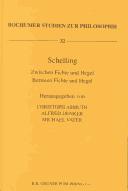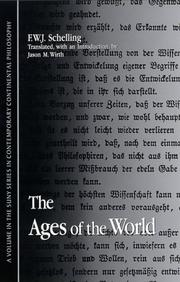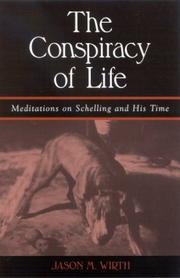| Listing 1 - 10 of 40 | << page >> |
Sort by
|
Book
ISBN: 9781474451284 1474451284 1474451306 1474451314 Year: 2021 Publisher: Edinburgh: Edinburgh University Press,
Abstract | Keywords | Export | Availability | Bookmark
 Loading...
Loading...Choose an application
- Reference Manager
- EndNote
- RefWorks (Direct export to RefWorks)
Charlotte Alderwick presents Schelling’s ontology as fundamentally power-based. She demonstrates that this ontology enables his unique conception of human freedom outlined in the 'Freedom' essay. This distinctive reading demonstrates that Schelling’s power-based ontology can usefully problematise and supplement contemporary work on power-based ontologies. First, where current work focuses on powers in relation to specific areas of metaphysics, Schelling provides a holistic picture, encompassing these areas into a single ontological story. Secondly, engagement with Schelling’s work points to problems (and to possible solutions) that will arise for any power-based metaphysics, but have not been examined in the literature.
Book
ISBN: 1474451314 1474451306 Year: 2021 Publisher: Edinburgh, Scotland : Edinburgh University Press,
Abstract | Keywords | Export | Availability | Bookmark
 Loading...
Loading...Choose an application
- Reference Manager
- EndNote
- RefWorks (Direct export to RefWorks)
Charlotte Alderwick presents Schelling's ontology as fundamentally power-based. She demonstrates that this ontology enables his unique conception of human freedom outlined in the 'Freedom' essay and can usefully problematise and supplement contemporary work on power-based ontologies.
Book
Year: 1984 Publisher: Indiana University Press
Abstract | Keywords | Export | Availability | Bookmark
 Loading...
Loading...Choose an application
- Reference Manager
- EndNote
- RefWorks (Direct export to RefWorks)
Marx's book throws considerable new light on German idealism.
Book
ISBN: 143843412X 144168705X 9781441687050 9781438434124 9781438434117 1438434111 Year: 2011 Publisher: Albany State University of New York Press
Abstract | Keywords | Export | Availability | Bookmark
 Loading...
Loading...Choose an application
- Reference Manager
- EndNote
- RefWorks (Direct export to RefWorks)
The life and ideas of F.W.J. Schelling are often overlooked in favor of the more familiar Kant, Fichte, or Hegel. What these three lack, however, is Schelling's evolving view of philosophy. Where others saw the possibility for a single, unflinching system of thought, Schelling was unafraid to question the foundations of his own ideas. In this book, Bruce Matthews argues that the organic view of philosophy is the fundamental idea behind Schelling's thought. Focusing in particular on Schelling's early writings, especially on Plato and Kant, Matthews explores Schelling's idea that any philosophical system must be perspectival and formed by each individual student of philosophy, providing a unique new understanding to an important and often overlooked figure in the history of philosophy.

ISSN: 1384668X ISBN: 9060323599 9786613128096 9027284245 1283128098 9789060323595 9789027284242 Year: 2000 Volume: 32 Publisher: Amsterdam: Grüner,
Abstract | Keywords | Export | Availability | Bookmark
 Loading...
Loading...Choose an application
- Reference Manager
- EndNote
- RefWorks (Direct export to RefWorks)
Book
ISBN: 889998252X 8897523226 8897523218 Year: 2012 Publisher: Accademia University Press
Abstract | Keywords | Export | Availability | Bookmark
 Loading...
Loading...Choose an application
- Reference Manager
- EndNote
- RefWorks (Direct export to RefWorks)
«Si tratta di dimostrare in tutto l’essere empiricamente dato, come suoi elementi, e certo come i suoi unici elementi, quei due principi, Volontà e Idea (o Rappresentazione), che con pari diritto sono sostenuti, in quanto attributi, da una sostanza individuale che è in essi identica» (Eduard von Hartmann).
Book
ISBN: 1000107477 1134960727 0415756359 1280182636 0203300246 0203006011 9780203300244 9781000158786 1000158780 9781003071310 1003071317 9781000136708 1000136701 9781000107470 1138171964 9781138171961 1134960719 Year: 2021 Publisher: Abingdon, Oxon New York, NY Routledge, Taylor & Francis Group
Abstract | Keywords | Export | Availability | Bookmark
 Loading...
Loading...Choose an application
- Reference Manager
- EndNote
- RefWorks (Direct export to RefWorks)
Andrew Bowie's book is the first introduction in English to present F. W. J. Schelling as a major European philosopher in his own right. Schelling and Modern European Philosophy, surveys the whole of Schelling's philosophical career, lucidly reconstructing his key arguments, particularly those against Hegel, and relating them to contemporary philosophical discussion. For anyone interested in German romanticism and the development of Continental philosophy, this is an invaluable source book. The cogent and subtle argument of this book fills a major gap in our understanding of modern philosophy, in which Schelling emerges as a key transitional figure.

ISBN: 0585067910 9780585067919 0791427455 0791427463 1438420579 Year: 1996 Publisher: Albany : State University of New York Press,
Abstract | Keywords | Export | Availability | Bookmark
 Loading...
Loading...Choose an application
- Reference Manager
- EndNote
- RefWorks (Direct export to RefWorks)

ISBN: 0791444171 079144418X 0585353328 9780585353326 9780791444177 9780791444184 Year: 2000 Publisher: Albany State University of New York Press
Abstract | Keywords | Export | Availability | Bookmark
 Loading...
Loading...Choose an application
- Reference Manager
- EndNote
- RefWorks (Direct export to RefWorks)
A new translation of the third and most sustained version of Schelling's magnum opus, this great heroic poem is a genealogy of time. Anticipating Heidegger, as well as contemporary debates about post-modernity and the limits of dialectical thinking, Schelling struggles with the question of time as the relationship between poetry and philosophy. Thinking in the wake of Hegel, although trying to think beyond his grasp, this extraordinary work is a poetic and philosophical address of difference, of thinking's relationship to its inscrutable ground.
God --- Ontology --- 091 SCHELLING, FRIEDRICH WILHELM JOSEPH --- Being --- Philosophy --- Metaphysics --- Necessity (Philosophy) --- Substance (Philosophy) --- 091 SCHELLING, FRIEDRICH WILHELM JOSEPH Handschriftenkunde. Handschriftencatalogi--SCHELLING, FRIEDRICH WILHELM JOSEPH --- Handschriftenkunde. Handschriftencatalogi--SCHELLING, FRIEDRICH WILHELM JOSEPH --- Misotheism --- Monotheism --- Religion --- Theism --- GOD --- RELIGION

ISBN: 0791486605 1417538716 9781417538713 079145794X 9780791457948 0791457931 9780791457931 9780791486603 Year: 2003 Publisher: Albany, NY State University of New York Press
Abstract | Keywords | Export | Availability | Bookmark
 Loading...
Loading...Choose an application
- Reference Manager
- EndNote
- RefWorks (Direct export to RefWorks)
The Conspiracy of Life offers a series of meditations on the philosophy of F. W. J. Schelling (1775–1854), a great—and greatly neglected—philosopher of life. Rather than construing him as a loopy mystic, or as an antiquated theologian, Jason M. Wirth attempts to locate Schelling as the belated contemporary of thinkers like Heidegger, Derrida, Bataille, Irigaray, Foucault, Deleuze, Levinas, and many others. As such, Schelling is already at the central nerve of current discussions concerning the crisis of truth; the primacy of the Good; the ecstatic nature of time; the nature of art; deep ecology; the world as an aesthetic phenomenon; comparative philosophy; the possibility of non-dialectical philosophy; radical evil; the haunting of philosophy; and the possibility of a philosophical religion.
| Listing 1 - 10 of 40 | << page >> |
Sort by
|

 Search
Search Feedback
Feedback About UniCat
About UniCat  Help
Help News
News